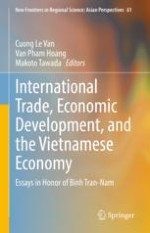2022 | OriginalPaper | Chapter
Smarter Teachers, Smarter Students? Some New Evidence from Sub-Saharan Africa
Authors : Nadir Altinok, Phu Nguyen-Van
Published in: International Trade, Economic Development, and the Vietnamese Economy
Publisher: Springer Nature Singapore
Activate our intelligent search to find suitable subject content or patents.
Select sections of text to find matching patents with Artificial Intelligence. powered by
Select sections of text to find additional relevant content using AI-assisted search. powered by
